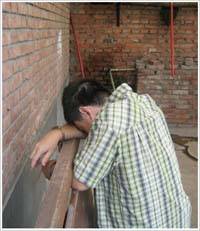Educational system incurs juvenile delinquencies
By Guo Qiang (chinadaily.com.cn)Updated: 2006-11-06 17:22
When Dao Meilan, a member of the National People's Congress, stepped into a drug addiction treatment center in Kunming, Yunnan Province, she saw the center was filled with teenage drug addicts.
|
"The examination-orientated system results in students feeling frustrated with their education, which will bring about a grave trend in juvenile delinquency," Deputy Wang Yongyan says.
Wang's remarks came when deputies were gathering to make amendments to China's decades-old Law of the People's Republic of China on the Protection of Minors, which took effect in 1991.
According to the newspaper, thirty six per cent of middle school students show signs of nervousness, exhaustion, fear, and worry as they prepare to enter schools and less than 50 per cent are interested in their studies. Some 80 per cent cannot bear the cutthroat College Entrance Examination, believing they are failures.
China's education system confines students to rote memorization in order to do well on test scores. It offers basic knowledge rather than an incentive to generate students' creativity. It has been under constant criticism.
"There is no indication the system will undergo complete reform, and it is causing students to drop out of school and become juvenile delinquents," Wang told the paper.
The system of high scores generating high salaries has contributed to the delay in system reform, according to the paper.
In response to this phenomenon, Wang says policies and social conventions give preference to students who score high in examinations.
"Therefore, students and teachers are inclined to pursue high scores and high salaries," he said.
According to a poll conducted by China's Ministry of Education, a total of 72 per cent of respondents, including parents and teachers, feel that it is most important for students to be able to endure tough situations. Children's performances at school rank third place, trailing just behind honesty. But the burden on students is still too tough, according to deputies.
"We never suffered through such an oppressive environment but we still had a bright future," deputy Zhu Shanping says. "Why do the schools press the students so hard?"
But Zhu's remarks undervalue an increase in the number of teenagers who are facing mounting pressure in fields such as education, employment and social welfare.
"Students have no time to think and communicate with their parents due to having to study for such a long time," says Zhu.
China had launched a campaign calling for alleviating pressure put on students, but students' bags are still stuffed with texts and exercise books.
Deputies urge implementing and monitoring a system to relieve pressure put on students.
"Teenagers should have time for self-development. They should be out in the sun. I suggest making my advice into law," Zhu told the paper.
"A campaign is not enough. There must be someone to monitor its implementation," deputy Yang Changhui said.
In an effort to lighten pressure on students, deputies also advise putting an end to training departments that cost a lot of money, much of which parents have to pay.
|
||
|
||
|
|


